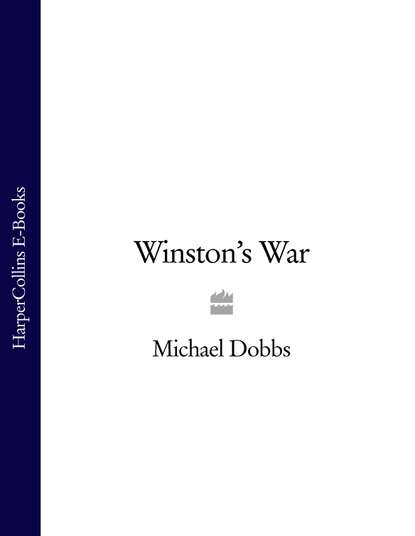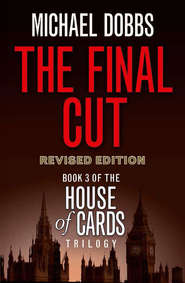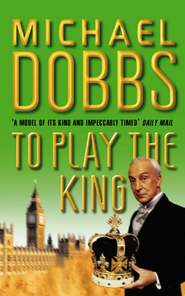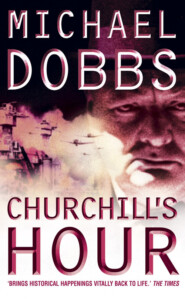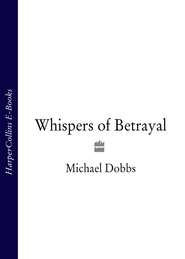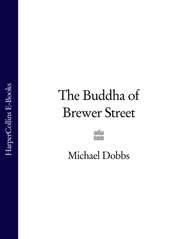По всем вопросам обращайтесь на: info@litportal.ru
(©) 2003-2024.
✖
Winston’s War
Настройки чтения
Размер шрифта
Высота строк
Поля
‘Not as old as Chamberlain.’ Burgess had meant to encourage, but already he was discovering how difficult it was to interrupt the Churchillian flow.
‘Hitler will give us war whether we want it or not. I have done all I can to warn of the perils, but no one listens. Look!’ He grabbed a pile of newspapers from his desk. ‘They call themselves a free press, but they haven’t a free thought amongst them. Chamberlain controls them, you know, all but writes the editorials for them.’ He threw the newspapers into the corner where they subsided like startled chickens. ‘What did The Times say this morning? I think I can recall them, words that burn into my heart. “No conqueror returning from a victory on the battlefield has come home adorned with nobler laurels than Mr Chamberlain from Munich yesterday…”.’ Churchill seemed incapable of continuing with the quotation, shaking his head. ‘He has sacrificed not only little Czechoslovakia, but also our honour.’
‘Hitler’s only got the German-speaking bits of Czechoslovakia.’
Churchill turned on Burgess with fury. ‘He has got everything he wanted. He demanded to feast upon a free and democratic country, and instead of resisting we have offered to carve it up for him course by course. Some today, the rest tomorrow. It won’t even give him indigestion. You know the Czechs had thirty divisions of fine fighting men? Thirty divisions – imagine! Protected behind great bastions of concrete and steel. Enough to give Hitler endless agonies, but instead of fighting they are reduced to raising their frontier posts and waving the Wehrmacht through. The Nazis have been able to occupy half of Czechoslovakia with nothing more threatening than a marching band.’
The cigar had gone out, exhausted, but Churchill seemed not to have noticed. He was standing by the window, looking out over his beloved countryside towards the Channel and the turbulent continent that lay beyond. ‘I love this spot. It was once so quiet, so peaceful here, Burgess, yet now there is nothing but the howling of wolves from every corner of Europe. They are growing louder, more insistent, yet there is nothing I can do about it. I am alone.’ The old man sank into silence, his body seeming to deflate as Burgess watched. The shoulders that had belonged to a prizefighter now seemed merely hunched and cowering before the blow that was to come.
‘Mr Churchill, you are not alone. There are many of us who share your fears.’
‘Are there? Are there truly?’ Churchill turned. ‘Not according to those harlots who infest Fleet Street.’ He lashed out with his foot at the pile of newspapers.
It was odd, Burgess thought, for a politician like Churchill who took the shilling of Fleet Street as regularly as anyone in the land to describe them as harlots. Odd, but not incorrect.
‘What can I do? I have no armies to command, no powers to turn against the enemy.’
‘You have a voice.’
‘One voice lost in the midst of the storm.’
‘When a man is drowning even one voice can represent hope. Encourage him not to give up, to continue the struggle. And you have the most eloquent voice of our time, Mr Churchill.’
‘No one listens.’ The head had dropped.
‘Fine,’ Burgess spat, ‘give up if you want to, but you may just as well fall in behind Chamberlain and start practising the bloody goose-step. That’s not good enough for me. I’m only twenty-seven and if there’s war then I’ll be one of the first sent out to get my bollocks shot away while the old men sit around their fires and pretend that this god-awful war was really someone else’s fault. Just like they did last time.’ He paused, not bothering to hide the contempt in his voice. ‘So how old are you, Mr Churchill?’
Churchill’s eyes were ablaze, ignited by the insolence. It took many moments of inner turmoil before he found himself able to reply. ‘I’m sixty-three, Mr Burgess. But my dear wife often remarks that I am remarkably immature for my age. Would you by any chance have time for lunch?’
They lunched in the dining room at the circular oak table. Churchill muttered apologies – his wife was away in France and there was only one house servant on duty; they would have to make do with cold cuts. They reinforced themselves with a second large whisky and a bottle of claret. Burgess found the atmosphere inside the house stretched, almost painfully quiet. The world outside was on the verge of Armageddon yet at Chartwell time seemed to be standing still. There was no insistent jangling of the telephone, no scribes rushing back and forth with messages and documents of state, no grand visitors at the door requesting an urgent audience, nothing but two lonely men, one old, the other young, both crumpled.
‘You see, Burgess, the greatest threats to our island have always arisen in Europe. Our Empire spans the globe, we have helped civilize half the world, yet every time we embark upon an adventure on the continent, instead of grasping glory we end up covered in regret.’ Churchill, who was carving, slapped a thick chunk of ham onto his guest’s plate. ‘At the time, of course, it always seems so different. Europe is like a fine broad stairway of hope, but after a bit the carpet comes to an end. A little further on we discover only flagstones, and a little further on still these break beneath our feet. Now they have crumbled completely and we are supported by nothing more substantial than Mr Chamberlain’s aspirations.’
‘But we have friends in Europe. Friends who still have great armies.’
‘Like the Poles? They have very fine cavalry, Burgess, and as you may know I have a particular love of cavalry. Why, I myself had a part in the last great cavalry charge ever made by the British Army. At Omdurman. Oh, that was a splendid piece. But there we faced an opponent armed with spears, not artillery and machine guns.’
‘I was thinking more of the French.’
‘You forget! The surrender at Munich was signed not only by Chamberlain but also by Daladier.’ He slurped vigorously at his glass of claret. Burgess followed him. It was a fine vintage, better than any Burgess could afford. A little of it dribbled from the glass onto the front of Churchill’s boiler suit, which Burgess noted bore the stains of similar encounters. Churchill was not elegant when he ate. There was too much energy bottled up within him, too much impatience to give much heed to manners. ‘The French have vast armies,’ he continued, ‘but that’s been true since the time of Napoleon, and yet they have gone down to one miserable defeat after another, as if the habit of losing has become an infection.’
‘Do you discount Russia?’
‘Ah, the Bolshevists! How I hate them. They are butchers.’ A forkful of ham waved in Burgess’s direction. ‘But I dare not discount them. They exist and by God they put the fear of damnation into all those around them, Hitler and his Huns, too. Stalin’s capacity for slaughter knows no bounds, but he’s been too busy slaughtering his own to have time or temper for turning against Berlin.’
‘They could never co-exist, Russia and the Fascists.’
‘Perhaps you are right. Maybe Russia is the answer, but if so it only shows us the terrible nature of the questions we are facing.’ Suddenly Churchill’s eyes darted across the table like arrows. ‘You one of those Communistic types, Burgess? I hear there’s a whole nest of ’em inside the BBC.’
‘At Cambridge, like so many others. There seemed no other choice if one wanted to stand up to Fascism. But that was a long time ago. People change. I seem to think you were still a member of the Liberal Party in those days.’
‘No. I had switched back to the Conservative cause by then. But I take your point.’
‘There is nothing worse than a fixed mind and closed eyes. While I was up at Trinity our esteemed Mr Chamberlain came as the guest of honour to our Founder’s Feast. He was Chancellor of the Exchequer then, of course, and we put on the full works – college silver, six courses, including the fatted calf. He was exceedingly reassuring. As the port circulated he told us that we need not worry, there was no hunger about, not even amongst the unemployed. Those were his exact words – not even amongst the unemployed. You’ll remember the times. Two million in the dole queues and hunger marches the length of the nation. Yet Chamberlain couldn’t see them. I almost threw up.’
‘Yet you didn’t. You look like a man with a strong stomach.’ Churchill almost smiled, recognizing a man whose capacity in those quarters might even be a match for his own.
‘No, I didn’t throw up. Instead I stood up. Started shouting. Called him an ignorant provincial ironmonger. The dining hall at Trinity has an amazing echo. Caused one hell of a scene.’
‘Ah, but now the crowd gathers to cheer him.’
‘Should’ve been a lynch mob!’
They had both consumed too much claret for subtle jibes and there was no hiding the vehemence of the younger man’s words. Churchill remained silent for a moment, staring intently, and Burgess thought he might have gone too far.
‘We have much in common, Burgess, you and I.’
When next the younger man spoke, his voice betrayed a tremble, not of sycophancy but of a passion that sprang from deep within. ‘I fear for my country, and I fear for the entire civilized world. There is nothing I wouldn’t do to stop the spread of Fascism. And with all my heart I can tell you, sir, that at a time such as this there is no one in whose company I would rather be.’
Churchill’s voice crumpled with emotion. ‘Then, as you say, I am not alone.’
He was up from the table now, a fresh cigar between his lips, and gazing out through the windows that stretched from floor to ceiling.
‘I had always thought I should retire here, Burgess. Spend my final days gazing out over these fields.’
‘I hope you shall. When the time comes.’
‘Whenever the time comes, I fear it will not be here.’ Churchill sounded as if he were saying goodbye to an old friend. ‘It seems that Clemmie and I shall have to leave.’
‘For safety?’ It didn’t take a military genius to recognize that Chartwell sat directly beneath the bombing path to London.
Churchill shook his head sadly. ‘It is one of the many ironies littering my life that it is the very lack of war that may force me to leave my home, Burgess. It’s no state secret that I have been neglecting my financial affairs in recent times – I have been devoting myself to politics, even though politics have so steadfastly declined to devote themselves to me. The vast majority of my income is generated by my writings, but the books and articles that should have been written have remained locked up in my mind.’
‘But you said the lack of war …’
‘A few months ago I was forced to place Chartwell up for sale. It almost broke my heart. I have created so much of it with my own bare hands, I love it without reservation. But as I despaired, another policy presented itself to me. If war were to break out in Europe, the value of everything in this corner of the world would be crushed, while investments in America would rise to ever greater heights. The New World refreshing the Old. It’s a policy that appeals to me; as you probably know my mother was American.’ Churchill’s mother, Jennie, had been a New Yorker who pursued life with a remarkable vitality that had encompassed three husbands and a multitude of more dubious liaisons. The first of her husbands had been Churchill’s father, who had been a classic example of ducal degeneracy, and they had both neglected their son as sorely as they neglected each other, yet Churchill clung to the wreckage of their reputations like a man adrift. He was at a side table now, pouring substantial cognacs. ‘So I took Chartwell off the market and, in the expectation of war, invested every penny I could raise in short-term stocks on Wall Street. I should by now be sitting on a small fortune.’
‘But Chamberlain comes crawling back from Munich …’
‘An umbrella torn to pieces by the storm. We seem destined to cross each other, Chamberlain and I. He beat me for the leadership of our party, then ignored my claim to office in his Government. He has tried to isolate me, now he may succeed in crushing me.’
‘Because there is to be no war.’
‘Not soon enough for my investments.’
‘What will you do?’
The lower lip jutted forward. ‘Comfort myself in the knowledge that he is wrong, and that in the end I shall be proven right. And hope I may still be alive when that happens. Try to find consolation in the thought that – in war – buildings such as this have a value no greater than the pile of rubble they leave behind.’ There was an unmistakable dampness in the pale blue eyes.





